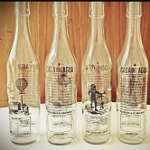
 For nearly 10 years, Japanese researchers from the agribusiness group House Foods have been working on an onion variety that prevents from crying when being cut. In 2002, scientist Shinsuke Imai's team published the results of a primary study pointing to the existence of alliinase, an enzyme responsible for the tears when slicing the vegetable.
For nearly 10 years, Japanese researchers from the agribusiness group House Foods have been working on an onion variety that prevents from crying when being cut. In 2002, scientist Shinsuke Imai's team published the results of a primary study pointing to the existence of alliinase, an enzyme responsible for the tears when slicing the vegetable.
Thus, the onion gorges itself with the sulphur contained in the soil during its grown. When chopped, the alliinase is released and creates a reaction by entering into contact with the sulphur in the different layers. As specified in an article from the French economic newspaper Les Echos, the result of this reaction settles in the lachrymal fluid and changes into sulphuric acid. The purpose of the lachrymal fluid being to protect the eye, the body responds to this "attack" with an additional production of tears.
Having genetically isolated that enzyme, the research team has developed an onion range that can be sliced without a tear. Likewise, they took the opportunity to reduce its odour and preserve the consumer's breath. It should be noted that Shinsuke Imai had already received an IgNobel after its primary study was published in 2002, that price rewarding scientific researches deemed to be useless. Furthermore, House Foods hasn't shared any information yet regarding its commercialisation and its use in curries and other condiments sold by the brand.
News in the same category
Musgrave, Ireland’s 140 year old food wholesaling and retailing giant, is having a nibble at the fast-food market in Northern Island. Musgrave’s business interests now cover Ireland, Northern Ireland and Spain.
Seen as the future in world food, edible insects are being transformed for the more reticent. While Micronutris raises them and produces chocolates, crackers and biscuits, Ento is going for innovative restaurants.
In time for veganuary, grocery and restaurant outlet Eat 17 will be welcoming Biff’s Jack Shack to their Walthamstow Store in East London.
At a time when blue gold is already a challenge for many countries, the Casa del Agua bar collects, distills, purifies and re-mineralises Mexico rainwater, in front of the client. Served and sold, it retails at 40 dollars for a 600mL bottle.




